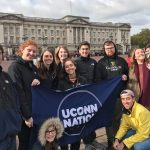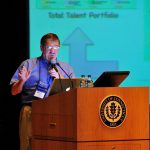Preston Green noted that the Trump administration’s analysis still doesn’t seem to allow for federal money for charter schools run in a religious manner, but said this could be a step in that direction. This “is a further advancement of what they want in the end, which I think is direct funding of religious education,” he said.
Associate Professor David Moss has spent the past six years actively expanding Neag School study abroad programs around the world as the Neag School’s global education director, and the past 20 years coordinating UConn’s long-standing London study abroad program in education.
Joseph Renzulli served as founding director of the Neag Center, the Lynn and Ray Neag Endowed Chair for Talent Development, as well as the first director of the National Research Center on the Gifted and Talented (NRC/GT), then one of a dozen centers in the U.S. focused on addressing significant issues in the education of gifted and talented students, and enrichment education. Under Renzulli’s guidance, the Neag Center evolved into one of the leading centers in gifted education and talent development in the world.
In this episode, Nicole talks to colleague Dr. Jennifer (Bruening) McGarry, a professor of sport management and department head in Educational Leadership in the Neag School of Education at the University of Connecticut and Executive Director Husky Sport. They discuss Jennifer’s career pathway, which includes stints as a coach and athletics director, her research related to gender and sport, which is focused primarily on barriers and supports for women, and those from minoritized ethnic and socio-economic groups. Jennifer also offers advice to women who want to pursue a career in sport.
Violet Jiménez Sims, associate director of teacher education for School-University Partnership at the University of Connecticut’s Neag School of Education, agrees that this year is certainly different. Over the summer, UConn met with partner districts to map out clinical placements. The first thing they learned: not everyone’s definition of hybrid is the same.
“Some were pivoting from in-person to virtual learning and grappling with how many individuals would be allowed in classrooms,” Sims said.
“Our number-one goal is to enhance the quality of life of those with developmental disabilities and that of their families,” says early childhood intervention expert Dr. Mary Beth Bruder, the UCEDD’s director and professor of public health sciences and pediatrics at the UConn School of Medicine and Neag School of Education. “A qualified workforce to help accomplish this goal is critical for all of society.”
On September 22, the Duke University Talent Identification Program (Duke TIP) welcomed Dr. Del Siegle, who is a professor in the University of Connecticut’s Neag School of Education and the director of the National Center for Research on Gifted Education (NCRGE), to deliver a presentation entitled “Report from the NCRGE: Problems and Promising Practices in Gifted Education.”
D.C. turned to the Schoolwide Enrichment Model (SEM), used in more than 4,000 schools nationwide, and internationally. Joseph Renzulli and Sally Reis, professors at the University of Connecticut’s Neag School of Education, created their model to help diversify accelerated classes and gifted programs by encouraging school systems to broaden their concept of giftedness and ferret out student potential beyond what’s measured by standardized tests. The method assesses qualities such as motivation, curiosity, empathy, creativity and self-regulation, and exposes young students to a wide range of enriching experiences to discover what excites them.
Editor’s Note: The following piece was originally published in UConn Today. In-person, hybrid, remote, and/or home-school – the options for K-12 schooling during the pandemic are complicated, each with their own pros and cons. UConn Today asked psychologist Sandra Chafouleas, Board of Trustees Distinguished Professor and Neag Endowed Professor in the Department of Educational Psychology, […]
“The process of being creative does a whole bunch of really good things for us,” physically and mentally, said James C. Kaufman, professor of educational psychology at the Neag School of Education at the University of Connecticut in Storrs. Kaufman, who has written extensively about creativity, said there are many reasons why a stimulating hobby can help us. The first is pretty simple: It’s fun.



